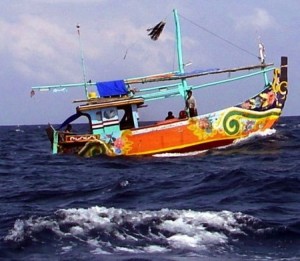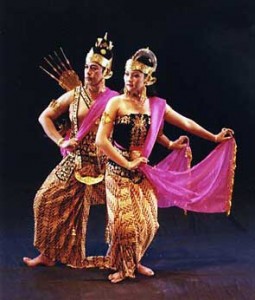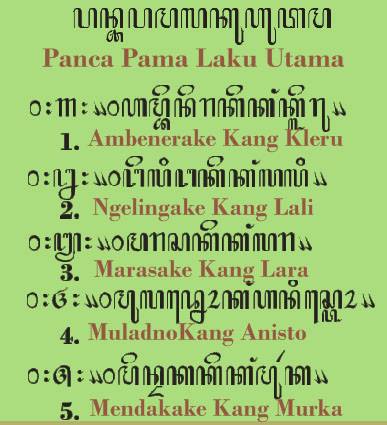
The Inner Wave style of Pencak Silat places an emphasis on principles over any particular technique. In practice this means you begin to recognize the underlying advantages and disadvantages of the motion rather than memorizing specific techniques. The learning curve is definitely steeper with this approach, but I believe in the end it helps to develop a stronger martial arts awareness. Equally importantly, this understanding will help others to see the similarities across the arts, and will hopefully equip the practitioner to utilize their tools no matter what their endeavor. Listed below are some expressions that reflect the cultural background that result in this philosophy.
Tri Prasetya Pesilat (The Silat Practitioner’s Three Vows)

I am an individual with a noble mind and character.
I am a person who honors his fellow man and seeks in silence for friendship and peace.
I am a knight who upholds truth honesty and justice always resilient in facing life’s toughest situations and temptations.I am a silat player!
(The silat practitioner’s creed)
Pesilat adalah pribadi yang berbudi pekerti luhur
Pesilat adalah insan yang menghormati sesamanya serta mencintai persahabatan dan perdamaian
Pesilat adalah kesatria yang menegakan kebenaran, kejujuran, dan keadilan serta tahan uji dalam menghadapi cobaan dan godaan
(Original Indonesian)
A pesilat is an individual with a noble mind and character.
A pesilat is a person who honors his fellow man and seeks in silence for friendship and peace.
A pesilat is a knight who upholds truth honesty and justice always resilient in facing life’s toughest situations and temptations.
(English Translation)
Three Roles

The famous Javanese expression below explains the relationship between a wave and a boat. One interpretation of this metaphor is everyone has within them ability to be a teacher, a peer, or a student, and that every situation requires you to choose your role.
Ing ngarsa sung tuladha
Ing madya bangun karsa
Tut wuri handayani
(Javanese)
Di depan sebai pemimpin
Di tengah sebagai pemimbang
Di belakang sebagai pendukung
(Indonesian)
In the front as a leader
In the middle as a moderator
In back as an advocate
(English)
On knowledge and humility
As the primary staple of the Indonesian diet, the rice plant plays an important role in Indonesian culture. The following Javanese passage illustrates how our path to gain knowledge resembles the rice paddy which shoots up straight, but bends under its own weight as it comes to bear seed.
Mendem jero
Mikul dhuwur
Sura Dira Jaya ningrat
Lebur Dening pangastuti
Nglimu wos
Kedhah pepak
Mboten dangak
Buried deep
Or carried tall
All things big and nasty
Can be buried and washed away by a mind full of love, nobility, and character
With knowledge, like with the rice padi
The more it grows
The lower it must hang
On Motion and Sprituality
The first sultan of Yogyakarta, Hamengku Buwana I, used four Javanese terms collectively known as Mugen to describe how a warrior should live. The four parts of Mugen are Nyawiji, Greget, Sengguh, and Ora Mingkuh. Hamengku Buwana I considered these concepts the key to proper orientation and living, and today this philosophy still plays a prominent role in central Javanese culture.
Nyawiji
Literally translated as to become one. You may ask become one with what? If you follow the Javanese tradition, you may find that this ambiguity was intentional, allowing the interpreter space for his own assumptions and imagination. In a spiritual sense, one naturally concludes that this means one with nature, one with God, or one with all. In a martial sense, Nyawiji could be interpreted as becoming one between mind, body, and spirit. This could also be construed as oneness or singularity of focus. Others may consider the aspiration for Nyawiji to be the desire to attain fluidity of motion –flowing without distinct, noticeable transitions.
Greget
Literally: strong spirit or dynamic. In silat when we talk about jurus we usually talk about speed and power. Greget transcends this shallow meaning and refers to the ability to channel passion and energy toward a larger goal.
Sengguh
Translation: Fearless but still humble. The ethic of sengguh means to believe in one’s self without becoming too prideful or conceited. With regard to jurus, we aspire to move effortlessly and confidently, however we should be mindful of how we project ourselves. When fighting, the face plays as much of a role as our limbs. Projecting confidence will improve your motion, but arrogance may rob your movement of any power.
Ora Mingkuh
Literally translated as without flinching, ora mingkuh also refers to taking responsibility for our actions (and reactions). When talking of motion, this means performing without any doubt or hesitation, and understanding the consequences of your instincts. Flinching opposes the spirit of ora mingkuh as it is reaction without control or awareness. Similarly, ora mingkuh means having the character to accept hardship.
On the nature of conflict
The following Javanese expression summarizes how one should carry one’s self when dealing with conflict.
Javanese: Nglurug tanpo bolo – Menang tanpo ngasorake
Indonesian : Datang tanpa bala bantuan – Menang tanpa merendahkan
English: Come without reinforcements – Win without degrading
Panca Pama
1. Ambenerake kang kleru
Membetulkan yang bersalah
Right the wrong
2. Ngelingake kang lali
Mengingatkan yang lupa
(Make those who forget remember)
Help others to be mindful
3. Marasake kang lara
Menyembuhkan yang sakit
Heal the sick
4. Muladno kang anisto
Mengentas yang ternista
Pull up the dejected/humilated
5. Mendakake kang murko
Meredam yang murka
Calm the angry


